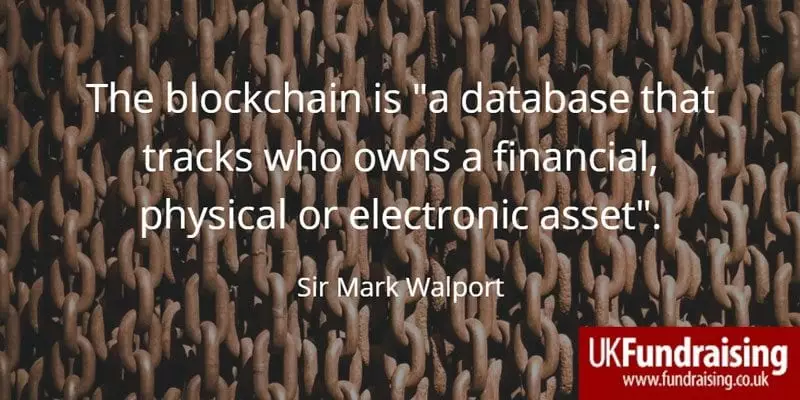Blockchains, Bitcoins and fundraising
Why should fundraisers pay any attention to blockchains and what on earth are they anyway?
Firstly, a blockchain is “a distributed database that maintains a continuously growing list of transactional data records hardened against tampering and revision”. It is a system of recording transactions like the spending of bitcoins, or agreements like contracts which are held in a series of data blocks each timestamped and linked together. Hence the name blockchain. See Wikipedia.
This does away with a middleman or central authority authorising and validating the transactions, and leaves whole industries like banking, the law, accountancy and government susceptible to disruptive change. Even the Bank of England’s chief economist has said that blockchain related currencies could replace cash, though he perhaps underestimates its potential – who now really needs banks?
Okay it is early days, probably very early days, but we can already see the blockchain effect beginning to happen for charities. For example, United Way and Greenpeace both accept bitcoin and for the donor it gives clarity over where the money is going and makes the process safe, as there is no chance of cheques being intercepted or bank accounts hacked. If you want to give large sums to charity it is far easier to do that through bitcoin than a conventional bank, which may query the transaction and charge for the transfer. These processing fees make tiny transfers of money uneconomic, but with bitcoin and other alternative currencies new ways of fundraising become possible.
Secondly, small amounts given to charity per transaction can add up when large numbers of people join in and rather than constituting a one-off appeal this can continue year after year. Consider the similar case of the Mayor’s Fund’s ‘Penny for London’ campaign which takes a penny (or agreed amount) off donors’ contactless card transactions on the Underground, on buses and other places like Leon’s, Café Nero and VISA. Some 7% of journeys are paid for by contactless and the figure is rising steadily, making this form of fundraising increasingly both viable and attractive.
Once donating small amounts and rounding up on utility bills etc. becomes economically feasible then that opens the doors to one of the ideas in the Charities Aid Foundations recent report on alternative currencies ‘Giving a bit – coin’. This essentially looks at the situation that will exist as household appliances etc. become connected (the internet of things) and can sell their spare processing capacity; but there are many more reasons to welcome the development of blockchains.
So what should the tech savvy fundraiser do?
- Buy bitcoins and see how they work.
- Read the CAF report on blockchain based currencies http://bit.ly/1Rlpxyt .
- Think like an entrepreneur about possible blockchain based innovations.
- Prepare your charity, especially your boss, so they are psychologically ready to test new ideas; and ensure you are first in the new field, as the early adopters are likely to scoop the mass giving prizes.
- Think how social media may help to drive these new giving channels.
Okay, much of this may be some way off, but the direction of travel is towards blockchain based transactions and we will undoubtedly see larger and larger amounts given to charities through blockchain based innovations over the next few years.
John Baguley
CEO Group IFC
Advertisement




